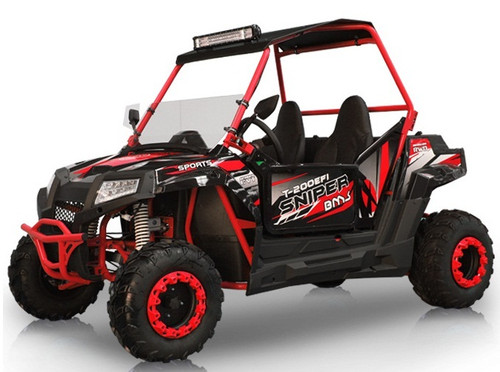UTVs
are pretty expensive. You, like every other, wish to keep your UTV in
tip-top condition. So that you never experience a problem when riding
the car. Maintaining your side-by-side UTV
is essential if you want it to perform well and last for years.
Fortunately, UTV maintenance comes down with a few simple steps. A DIY
enthusiast with the necessary tools can accomplish it. Here is our top
advice for maintaining UTVs:
Check & change the engine oil
Let's
start by checking the engine oil & change it if necessary. It is
necessary in accordance with the manufacturer's instructions.The best
defence against engine wear and power loss is changing the oil. It is
recommended to use high-quality synthetic oil that does not contain the
impurities in conventional lubricants. As a result, they perform better
and last for longer. Changing the oil and filter more frequently is
crucial so that the side-by-side UTVs can be used for demanding work or
aggressive riding.

Check & Change the Differential Fluid
Extra weight and performance stress put significant stress on the gears. While the vehicle is moving, the lubricant covers the gear teeth to prevent metal-to-metal contact and wear. When extreme heat is present, the additional stress can weaken the fluid barrier and force lubricant out of the gears, leading to wear. Replacing the differential fluid as prescribed to the manufacturer's recommendations is the way to keep it in its best running condition. Choose a premium synthetic oil similar to what you would for your car. It increases the lifespan of your vehicle by providing better protective film under high pressure to safeguard gears and bearings in the harshest environments.
Verify & Replace the Air Filter
A combustion engine needs three components to function correctly: gasoline, ignition, and air. Unfortunately, most people don't have to pay for their attitude. It will cause them to forget about it! As a result, the engine will suffocate from a reduced airflow and decreased performance caused by a filthy or blocked air filter. Engine performance is reduced, and a dirty air filter decreases airflow. Additionally, it enables sand and dust to be drawn into the motor, resulting in premature wear. Seek advice from the manufacturer regarding how frequently to change the air filter. Check it often, and if it's dirty, replace it. Otherwise, the engine will absorb dirt, acting like sandpaper against the cylinders, rings, bearings, and other critical parts.

Stabilize the Gasoline
Many off-road enthusiasts keep their tanks full for months. But gasoline can decompose within 30 days. The decomposition process generates varnish inside the carburetor. It will obstruct the small gas passages. Eventually, it will prevent the proper gasoline circulation, and starting the UTV will become problematic. In addition, most types of gasoline contain ethanol, which can corrode carburetor components and damage rubber seals and fuel hoses. For best performance, use ethanol-free octane gasoline to prevent ethanol-related problems. At every fill-up, use a fuel stabilizer for optimum performance.
Wash your Machine Regularly
It is a fact that the powersports vehicles get dirty after every ride. But it shouldn't stay dirty. Dried mud and dirt will trap moisture, accelerating metal components' rust formation. In addition, the radiator can become less effective due to mud, leaves, and other debris jammed up against it, overheating the engine. A build-up of dirt near the engine and differentials can impede heat conduction, increase temperature, and hasten lubricant oxidation and breakdown.Wash it frequently to get rid of dirt, especially after each ride.If at all possible, pressure wash your car.

Now
that you've reviewed a few UTV maintenance mistakes. It will help you
take the best possible care of your off-roading machine. Contact AffordableAtv today to know even more about the side-by-side for sale, their parts, and advanced maintenance tips.
No comments:
Post a Comment